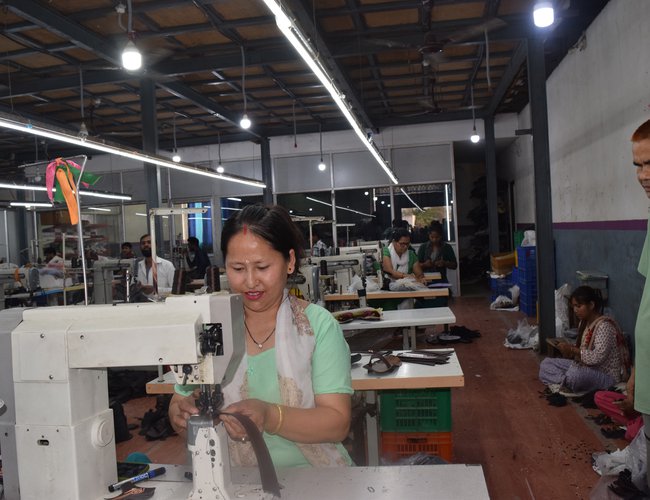
Sustainable job creation for youth and an enabling business ecosystem help attract private sector investment and mobilize local resources for enterprise development. This is a key priority for the government, development agencies and business organizations to address unemployment. In Nepal, several initiatives have been taken over time by the respective stakeholders. Recently, the Ministry of Industry, Commerce and Supply (MoICS) of the Government of Nepal and the International Fund for Agricultural Development (IFAD) completed the implementation phase of the Rural Enterprise and Remittance Project (RERP) in Madhesh and Koshi Provinces. Under the economic development component, there was a subcomponent on decent work, where about 29,500 youth were trained in various skills for gainful employment according to labor market demand in different sectors such as agriculture, construction, mechanical, electrical, electronic, service and garment. This was done in collaboration with local governments, private sector and private training providers with technical assistance from HELVETAS Nepal.
Through these skills development initiatives, RERP has been successful in retaining 79 percent of the skills graduates in the labor market, with 32 percent of the youth starting their own businesses through business services. These new entrepreneurs also create additional employment opportunities. It has been observed that integrated and collective efforts in collaboration with government and private market actors lead to successful enterprise development, which requires combined business services.
PoliticallyNepal operates under a federal system where roles, responsibilities, duties and rights are divided among three levels of government: local, provincial and federal. Local governments are closest to the people and provide basic public services at their doorsteps. Therefore, cooperation and partnership with local governments is a critical success factor to increase ownership and institutionalize processes.
As a pilot, two local governments in Madhesh Province (Hariwon and Barahathwa) and two others in Koshi Province (Itahari and Duhabi) were selected based on their interest in envisioning how to establish market-driven vocational skills development programs, leverage remittances in enterprises, and use the knowledge and skills of returnees for overall local economic development. The vision includes supporting local governments in industry-led skills development planning, increasing the production and productivity of local resources (including agriculture) through effective business service mechanisms, and developing an enabling business ecosystem for private sector investment.
A total of 2,800 people in four communities were interviewed and contacted to develop a people-centered strategy development process for market-driven technical education, vocational skills, and enterprise development strategies. Meanwhile, the project conducted a tracer study of the training batches of 2019 and 2020, involving 15,000 young people. Both studies aimed to document the current scenario and demand for skills development, employment patterns, and possible business opportunities, and to gather evidence-based feedback for designing technical education, vocational skills, and business development strategies in the changing federal context.
Key informant interviews, focus group discussions, secondary data analysis, report and desk reviews, validation workshops, contextual analysis, and resource and industry observations were the methodologies used. Data were collected using the KoBo tool. Approximately 14 stakeholders were identified from each community, including unemployed youth, returnees, lead farmers, production groups and cooperatives, entrepreneurs and their business associations, private and public training providers, skills graduates, trainers, left-behind family members, community leaders, and local governments for validation and context-specific strategy design.
Some key findings relevant to like-minded organizations such as government policy makers, development organizations, and programs and projects related to skills development and enterprise promotion are summarized below:
- The overall employment rate of skills development programs in 2019 and 2020 was 79 percent. Only 32 percent of skills graduates were able to establish self-employment or enterprises, often receiving business services from other agencies. Combined business services, such as business planning, financial services, market access, and legal and tax support, are essential to turning their ideas into self-employment and enterprises.
- Sixteen local governments in Koshi and Madhesh provinces have successfully implemented and funded skills development programs using results-based financing and monitoring systems, showing tangible results in job creation and enterprise development. However, a strong monitoring framework and policy guidelines are needed at the local level. A defined results-based payment modality helps to ensure the proper use of financial resources.
- Women's participation in non-traditional occupations will increase from 16 percent to 24 percent between 2019 and 2023. Joint efforts by local governments and the media, special support packages for women, and sensitization and awareness initiatives are supportive factors. However, job placement in non-traditional sectors is only 34 percent, indicating that a one-size-fits-all approach for women in skills and enterprise development is not effective. Tailored support packages are needed.
- Many skills graduates suggested revising the current modality of training delivery. They recommended incorporating multiple skills, skill upgrading, rotational skills, technology-based skills, e-learning, and practical applications into the skills development program as a pilot.
- Technical skills combined with business support services and soft skills are crucial for self-employment and entrepreneurship. It is essential to design separate skills training packages for wage employment and self-employment/entrepreneurship.
- Most skills graduates reported that the current curriculum does not meet the emerging market and technology needs. It needs to be updated and adapted in the mechanical, electrical, construction, hospitality, agriculture and service sectors.
- Privately run training providers are key players in technical skills, enterprise and job creation. However, their capacity and governance need significant improvement. Areas for improvement include procurement of services, monitoring and data systems, follow-up services, ethical business practices, instructor capacity, proper use of curricula and lesson plans, timely payment of suppliers, and social and gender accountability.
- Interviews with 240 returnees in the four communities revealed that 50 percent were employed, 24 percent were unemployed and looking for work, only 17 percent were self-employed, and 3 percent were planning to return to work abroad.
- Interestingly, about 50 percent of the returnees had learned new skills while working abroad, but 82 percent did not use these skills (in Duhabi and Itahari). This suggests that existing interventions for economic reintegration of returnees are inadequate. A timely review of interventions is needed to address these issues and to capitalize on their knowledge and skills for enterprise development as an opportunity.
Context-specific skills and economic development strategies are critical for job creation and enterprise development in collaboration with the private sector and government. Collaboration with local governments and private sector actors is essential to provide relevant skills training and business support services for local economic development. This integrated effort helps to retain skilled workers, promote entrepreneurship, and improve employment outcomes, ultimately driving economic development and job creation.
Note: The author was actively involved in the entire research and study process, including research planning, data analysis, and report preparation. The findings summarized above were used to prepare technical education, vocational training, and enterprise development strategies for four municipalities in Madhesh and Koshi provinces.
- Expanding Horizons: Filling the Gaps in Entrepreneurship in the Nepalese Context
- Jun 26, 2025
- Technology Revives Interest in Pottery Among Youth and Women
- Apr 08, 2025
- Enhancing Rural Entrepreneurship Through Business Services and Financial Inclusion: The Nepalese Context
- Oct 31, 2024
- Private Sector Investment: Opportunity And Challenges In Nepal
- Apr 25, 2024













